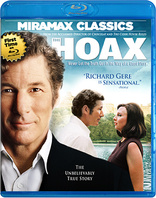The Hoax Blu-ray Movie
HomeThe Hoax Blu-ray Movie 
Echo Bridge Entertainment | 2006 | 116 min | Rated R | Mar 10, 2013Movie rating
6.6 | / 10 |
Blu-ray rating
| Users | 0.0 | |
| Reviewer | 3.5 | |
| Overall | 3.5 |
Overview
The Hoax (2006)
In the early 1970s, author Clifford Irving, with accomplice Richard Suskind, attempts to pull off one of the greatest media scams of the century. He writes a fake biography of reclusive billionaire Howard Hughes, claiming that Hughes commissioned it, and sells the book to publishing giant McGraw-Hill. Based on a true story.
Starring: Richard Gere, Alfred Molina, Hope Davis, Marcia Gay Harden, Julie DelpyDirector: Lasse Hallström
| Drama | Uncertain |
| Comedy | Uncertain |
Specifications
Video
Video codec: MPEG-4 AVC
Video resolution: 1080p
Aspect ratio: 1.85:1
Original aspect ratio: 1.85:1
Audio
English: DTS-HD Master Audio 5.1 (48kHz, 24-bit)
English: DTS-HD Master Audio 2.0 (48kHz, 24-bit)
Subtitles
None
Discs
50GB Blu-ray Disc
Single disc (1 BD)
Playback
Region A, B (C untested)
Review
Rating summary
| Movie | 4.0 | |
| Video | 3.5 | |
| Audio | 3.5 | |
| Extras | 3.0 | |
| Overall | 3.5 |
The Hoax Blu-ray Movie Review
The Madoff of Biography
Reviewed by Michael Reuben May 6, 2013Richard Gere may be best known for playing heroes and romantic leads, but his best performances have been as rogues and villains. The corrupt cop in Internal Affairs, the ethically challenged lawyers in Chicago and Primal Fear and his breakthrough appearance as a dangerous pick-up in Looking for Mr. Goodbar are among Gere's most memorable roles. Another performance that belongs in this gallery is Gere's unsettling portrait of a major American con man, author Clifford Irving, in director Lasse Hallström's overlooked 2006 gem, The Hoax. As of this writing, Irving is still alive and living quietly (more or less). But in 1971, long before James Frey fabricated tales of drug addiction he'd never endured and Margaret Seltzer invented a youth of gang violence she'd never experienced, Clifford Irving pulled off the granddaddy of all literary swindles. He persuaded publisher McGraw-Hill to pay $765,000—a huge sum in those days—for an "autobiography" by reclusive billionaire Howard Hughes that Irving and his friend, Richard Suskind, fabricated from scratch. Through a combination of research, forged handwriting and imaginative bravado, Irving managed to generate a manuscript that was convincing enough to fool even journalists who were familiar with Hughes from the days when he still gave interviews. McGraw-Hill was all set to publish it. Since Hughes hadn't been seen or heard from for years, Irving was counting on his continued absence to make the scam work. But on January 7, 1972, Hughes surfaced. Two days later, the world watched as seven journalists Hughes had known previously gathered to receive a call from the mystery man in which he denounced both Irving and the fake book. (I remember watching the broadcast; it was riveting.) After that, Irving's fraud quickly unraveled. He eventually served time in federal prison, as did Suskind and also Irving's wife, Edith, who had used forged ID to deposit checks made out to "H.R. Hughes" in a Swiss account. Irving eventually wrote his own account of the experience, which screenwriter William Wheeler adapted with so much disregard for the literal facts that Irving removed his name off the film and denounced it as fictitious upon release. The irony is appropriate to the subject. Irving, who was so effective at capturing the spirit of Hughes that his phony manuscript is (according to screenwriter Wheeler) a gripping read, objected to having Wheeler and Hallström do the same thing to him. (They, of course, never claimed to be telling the literal truth.)
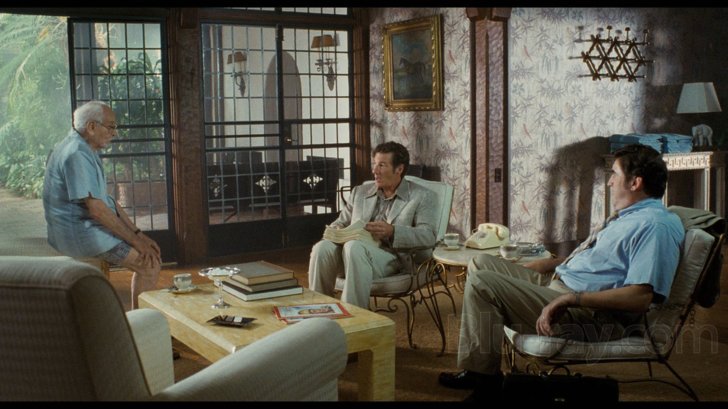
The film opens with a dramatic (and invented) scene atop the roof of the New York headquarters of McGraw-Hill, where Irving (Gere) and his editor, Andrea Tate (a superb Hope Davis), are awaiting a helicopter that is supposed to be bringing the secretive tycoon to a meeting demanded by the publishers. The story then rewinds four months to show how we reached that point. After disappointing sales of his book Fake!, about an art forger, Irving appears poised to rebound with a novel that Andrea assures him is a done deal to be published by McGraw-Hill. Irving celebrates by buying a new car for his Swiss-born wife, Edith (Marcia Gay Harden), a painter. The marriage is still recovering from Irving's recently ended affair with a married model and actress, Nina (Julie Delpy), but everything seems to be looking up—that is, until Irving attends a masquerade literary event, where he almost simultaneously bumps into Nina and learns from Andrea that the deal to publish his novel has fallen through. Desperate to save face, Irving grandiosely informs Andrea that he's working on the most important book of the century, but she has to come find him if she wants to bid on it. Then he has to produce an idea to justify the claim. After hours of fruitless brainstorming with Edith and his friend, Dick Suskind (Alfred Molina), Irving spots a magazine cover story on Howard Hughes and realizes that he can make up whatever he wants about the billionaire, because no one knows the truth. Even Hughes's employees only communicate with him through handwritten memos, which Irving learns to forge by copying exemplars reproduced in magazines. He informs his publisher that Howard Hughes has chosen him, Clifford Irving, to be the midwife of the mysterious magnate's autobiography. Much of The Hoax is taken up with the juicy details, many of them true-to-life, of how Irving fabricated his manuscript. Irving and Suskind work hard to dig up original material that will give their phony book the ring of authenticity. They visit a retired Hughes executive (Eli Wallach), who has written an extensive memoir he wants Irving to review and edit. Irving tells him it's unpublishable, but only after copying every page. They go to the Pentagon posing as directors of a Hughes defense contractor and miraculously gain access to confidential papers with extensive detail about the Hughes corporate empire. In an invented incident, a box of files arrives at Irving's door with no return address and a Las Vegas postmark containing damaging information about Hughes's dealings with President Nixon—and Irving takes this a sign that Hughes himself has learned of his project and is encouraging it. (In reality, no such files were sent, but the information about Hughes and Nixon was developed through a combination of sources and educated guesses. It became part of the swirl of White House paranoia that resulted in the Watergate break-in.) Gere is mesmerizing as a man so driven by a need for success that he takes ever greater risks, like a drug addict who must keep increasing his dose. "The more outrageous I sound, the more convincing I am", Irving tells Suskind at the outset, as he tries to convince him that he can successfully impersonate the eccentric Hughes. It works, but only up to a point. As publication nears, skeptics emerge, and Irving has to resort to desperate gimmicks to evade them (hence the helicopter stunt with which the film opens). Each time Irving confronts a new obstacle, Gere shows you Irving pausing and thinking, "Is this too much? Should I stop now?" Always, though, he takes a deep breath and piles on another layer of falsehood, until he's buried so deeply that he himself can't distinguish between fiction and reality. (Literally so; some of his experiences are later revealed as waking dreams.) "You're exhausted from your lies", Edith tells him, and she's right. When the elaborate scheme finally tumbles down, both Irving and the film breathe a deep sigh of relief.
The Hoax Blu-ray Movie, Video Quality 
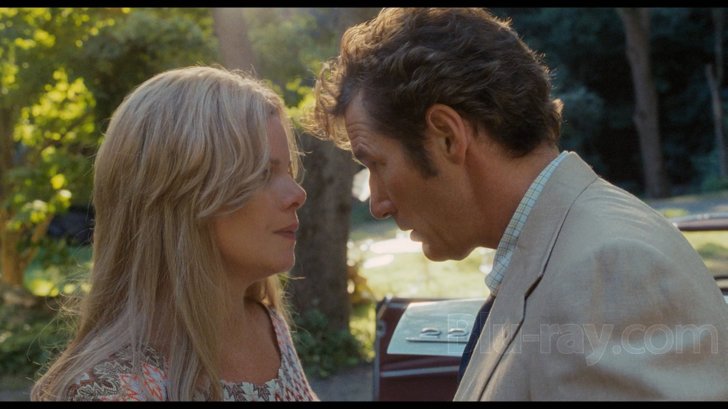
Shot by British DP Oliver Stapleton (The Guilt Trip) and finished on a digital intermediate, The Hoax is presented in a 1080p, AVC-encoded presentation that is one of Echo Bridge's better efforts. Presumably sourced from digital files, the master reveals a substantial amount of natural grain and fine detail in such demanding scenes as the masked ball where Irving receives the bad news about his novel, the launch party for the Hughes autobiography and outdoor scenes in and around Irving's home in Croton Falls. Blacks are solid and shades of black are well-delineated, providing good shadow detail, which is crucial in the many night scenes, especially a critical sequence where Irving is awakened by a call from his wife and suspects that his home has been invaded. Another scene shows the transfer's strength in handling contrasting areas of darkness and light, when Irving finds Dick Suskind in a bar late in the evening, drinking with two hookers and decides to join them for an impromptu "party". Colors are varied and saturated without being overstated. Given the era, it must have been a temptation for Hallström and his design team to fill the frame with fluorescent, "psychedelic" hues, especially since at least some of the characters would still own much of their Sixties wardrobe, but the palette remains realistic, with the occasional exception (e.g., Edith Irving's artwork). Low-grade video noise is sometimes visible, and some of it is undoubtedly due to unnecessarily tight compression. Although Echo Bridge has used a BD-50, at least 20 Gb of space remain empty. It was not necessary to compress the main feature to an average bitrate of 18.00 Mbps.
The Hoax Blu-ray Movie, Audio Quality 
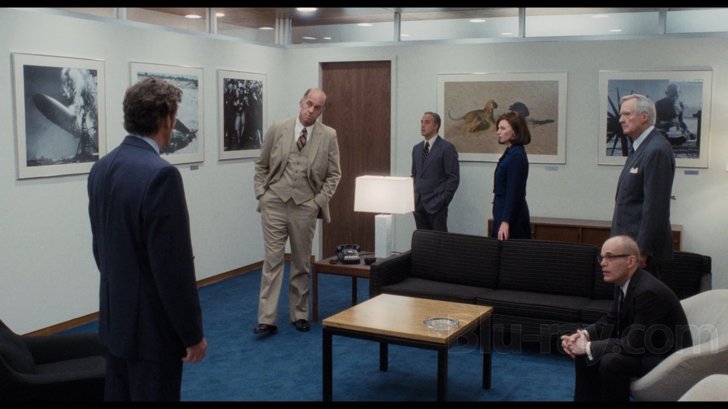
The film's original soundtrack is presented as lossless DTS-HD MA 5.1. The Hoax is a dialogue-driven film, but the dialogue reflects some interesting editing choices that become more pronounced as the film progresses and Clifford Irving's mental state deteriorates under the growing stress. Voices are sometimes in his imagination and sometimes real, and the sound editing plays tricks on the ear so that you don't always know which is which. Individual sound effects such as the pop of camera flashbulbs, the roar of a crowd or a ringing telephone are suddenly isolated and amplified, as a reflection of Irving's interior condition. All of these sounds are clearly and forcefully reproduced on the lossless track, with the rear speakers used primarily to reinforce the front speakers and expand the listening space. Carter Burwell's characteristically fine score shifts moods with the film's unique blend of elation and despair, and the soundtrack is enhanced by a wonderful selection of period-specific pop tunes, including George Harrison's "Here Comes the Sun" (performed by Richie Havens), several songs by Credence Clearwater Revival and, most appropriately, the Rolling Stones' "You Can't Always Get What You Want". There is also a stereo track encoded as DTS-HD MA 2.0.
The Hoax Blu-ray Movie, Special Features and Extras 
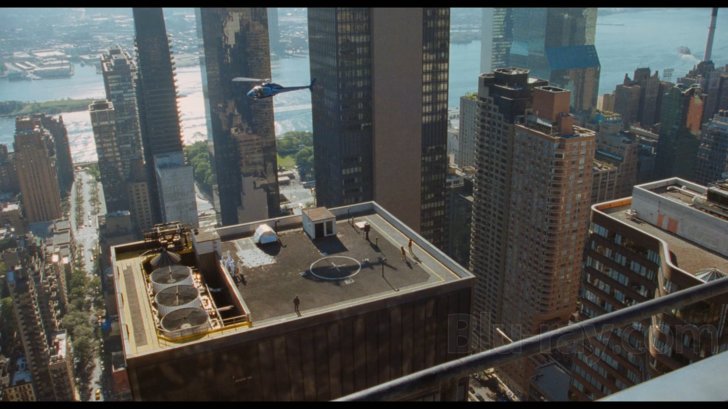
Echo Bridge has included some, but not all, of the features that accompanied The Hoax on Miramax's 2007 DVD. Omitted is a second commentary with producers Leslie Holleran and Joshua D. Maurer, and a featurette entitled "Mike Wallace 'Reflections on a Con'".
- Commentary with Director Lasse Hallström and Screenwriter William Wheeler: Hallström and Wheeler chat amiably, alternating between comments on specific scenes and more general exchanges about the real events underlying the film, Wheeler's departures from the facts (for many of which he provides explanations) and the actors' approaches to their characters and performance (much improv occurred on set). Hallström repeatedly expresses his pleasure at the opportunity to work on a story involving fantasy sequences, flashbacks and memories, after shooting so many films dominated by linear narrative.
- Stranger Than Fiction (480i; 1.33:1; 9:04): This brief "making of" featurette includes interviews with Gere, Molina, Hallström, Wheeler and Mike Wallace of 60 Minutes. It is bookended by short excerpts from Wallace's interviews with the real Clifford Irving in 1971, before his book was exposed as a fake, and many years later, after Irving had published the memoir on which the film is based.
- Outtakes and Unused Clips (480i; 1.78:1; 19:10): Most of these are alternate, somewhat longer versions of scenes in the finished film, presented without final effects or sound mixes.
- Deleted Scenes (with Optional Commentary) (480i; 1.78:1; 13:31): These scenes are presented in two versions, one with and one without commentary. They scenes can only be played as a group, and all but the first are preceded by title cards:
- [Scene 1: Circling the Car]
- Scene 2: Plotting the Story
- Scene 3: Nina in the Park
- Scene 4: Friendship Is Complicated
- Scene 5: What's Best for Dick
- Scene 6: The Phone Call
The Hoax Blu-ray Movie, Overall Score and Recommendation 
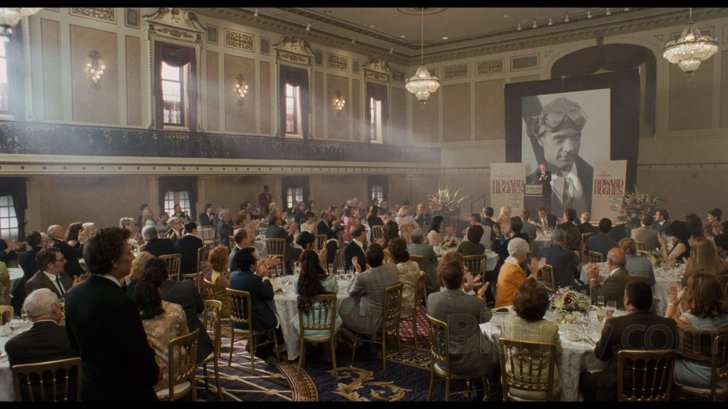
Compared to the era depicted in The Hoax, our current age of instant digital communication has made people both more skeptical and more credulous—more credulous, because the vaguest rumor or least reliable scrap of information can be instantly Googled, re-Tweeted and consumed worldwide within a matter of hours before anyone has had time to vet it; and more skeptical, because so many reports of that nature have turned out to be incomplete, misleading, outdated or just plain false. As depicted in The Hoax, and as it happened in real life, Clifford Irving's fraud occurred on a scale and at a level of effort that few would have the perseverance to pursue today. Ironically, the fake Hughes biography may have been Irving's greatest artistic achievement, because he literally had to imagine himself into the mind of Howard Hughes (an activity that the film dramatizes effectively in scenes where Gere's Irving records tapes "in character" as Hughes). If Irving had written the book as a novel, it would have been fine, except that no one would have been interested. Only the tantalizing prospect of touching the real Howard Hughes got people's attention and made the scam work. Like the Maltese Falcon, Hughes was the stuff that dreams are made of. Highly recommended.
Similar titles
Similar titles you might also like

A Good Person
2023

Skateboard
Slipcover in Original Pressing
1978

Snake & Mongoo$e
Snake and Mongoose
2013

Gone in 60 Seconds
1974

Born to Win
1971

Body Count
1998

The Paper
1994

The Sum of Us
1994

Gung Ho
1986

Roommates
1995

Memories of Me
1988

The Details
2012

Stay Hungry
1976

Rocky IV
1985

Play It to the Bone
1999

Mr. Church
2016

Drift
2013

Naked Lunch
1991

Swingers
1996

Plus One
2019
